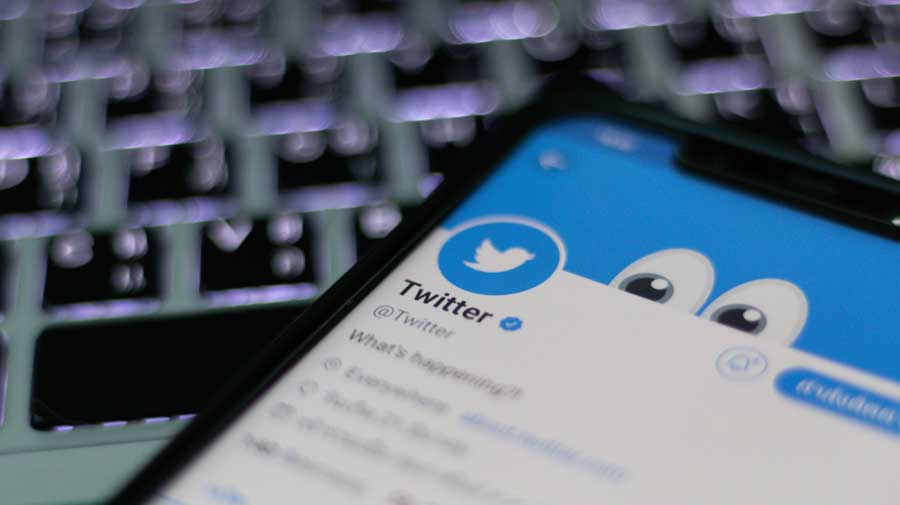Twitter on Wednesday cited Indian law to resist the Narendra Modi government’s directive to act against news media entities, journalists, activists and politicians over posts related to the farm protests.
But the microblogging site said it had permanently suspended over 500 other accounts and blocked access to some content in partial compliance with the Centre’s orders.
Twitter made the announcements in the morning in a blog, hours before its senior management was scheduled to meet ministry of electronics and information technology (MeitY) officials. The ministry took umbrage to the Twitter blog post ahead of the meeting, stating that such action was unusual.
Still, the meeting took place as scheduled and the IT secretary is understood to have insisted on full compliance with the directives issued since January 31 following the violence in Delhi during the farmers’ tractor rally on Republic Day.
Ajay Sawhney, ministry secretary, stressed at the meeting that Indian laws must be followed irrespective of Twitter’s own rules and guidelines. He pointed to Twitter’s differential treatment of the Capitol Hill violence and the chaos at Red Fort.
“A deep sense of disappointment at seeing Twitter side not with ‘freedom of expression’ but rather with those who seek to abuse such freedom and provoke disturbance to public order, was conveyed to the Twitter representative,” the ministry said in a late-night release.
Monique Meche, vice-president, global public policy, and Jim Baker, deputy general counsel and vice-president (legal), who represented the social media platform at the virtual meeting, “affirmed their commitment towards following Indian laws and rules,” it said.
Meche and Baker also expressed their continuing commitment towards building their services in India. They have also requested for better engagement between the government of India and Twitter’s global team,” the release said.
Twitter’s argument — as articulated in the blog — for not acting against the handles of news media entities, activists and politicians is that such actions are not consistent with Indian law.
“Because we do not believe that the actions we have been directed to take are consistent with Indian law, and, in keeping with our principles of defending protected speech and freedom of expression, we have not taken any action on accounts that consist of news media entities, journalists, activists, and politicians. To do so, we believe, would violate their fundamental right to free expression under Indian law,” the blog said.
The ministry first responded to Twitter’s blog from the home-grown microblogging platform Koo, where many from the government and the BJP’s ecosystem are opening accounts.
“Upon the request of Twitter seeking a meeting with the Govt, the Secretary IT was to engage with senior management of Twitter. In this light a blog post published prior to this engagement is unusual. Govt will share its response soon,” the ministry’s response read. The same message was later posted on Twitter.
Initially, 257 handles using the hashtag “ModiPlanningFarmersGenocide” had been suspended in keeping with the government’s request. Later, 126 of these accounts were deactivated on February 1 while the others were restored by Twitter. The IT ministry in further notices asked 1,178 handles to be deactivated for allegedly spreading misinformation. Of these, 583 accounts have been deactivated.
While the government had threatened penal action for non-compliance, Twitter had said while restoring the accounts that this action was in keeping with company policy, which favoured free speech.
Pavan Duggal, cyber law expert, said: “Twitter is an intermediary and cannot sit in judgement or partially implement the order. Once a legal liability is denied, it has to be prepared for legal damages under the IT Act. At the same time, at some point in time, jurisprudence under cyber law needs to evolve as to can an intermediary cross the Lakshman rekha and challenge the government?”
Other experts said the IT Act’s Section 69A had to be considered in entirety and flagged that it also spoke of reasonable restrictions. Twitter, if it does not act on a government order, has to face the consequences, including a jail term of seven years.
Twitter said in the blog post on Wednesday: “We will continue to advocate for the right of free expression on behalf of the people we serve. We are exploring options under Indian law — both for Twitter and for the accounts that have been impacted. We remain committed to safeguarding the health of the conversation occurring on Twitter, and strongly believe that the Tweets should flow.”
Twitter added that it had taken a range of enforcement actions -- such as permanent suspension of accounts in certain cases --- against more than 500 accounts escalated across all ministry orders for clear violations of Twitter’s rules.
“Separately, today, we have withheld a portion of the accounts identified in the blocking orders under our Country Withheld Content policy within India only. These accounts continue to be available outside of India,” Twitter said.
“We informed MeitY of our enforcement actions today, February 10, 2021. We will continue to maintain dialogue with the Indian government and respectfully engage with them.”











